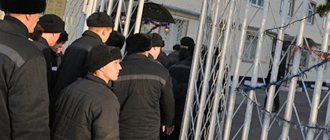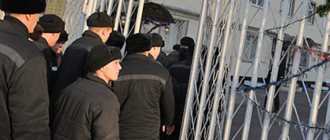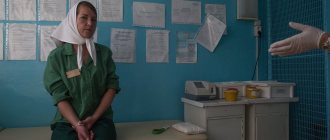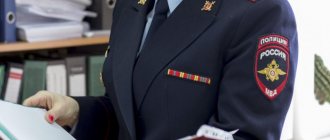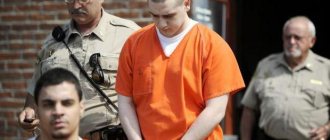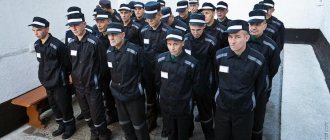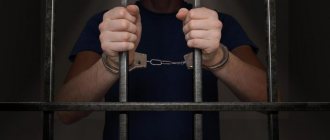Report from the Mozhaisk juvenile correctional colony. Part 2
Read part 1
“Actually, they came here partly because they didn’t want to study,” Colonel Oleg Merkuryev, the head of the colony, tells us. He gives volunteers of the “Lend Your Hand” foundation an impromptu excursion, which suddenly turns out to be on the topic “what and why a teenager should be taught in a colony.” And here they teach you how to wash socks, how to pass the Unified State Exam, and how to try out different professions.
Learn more about the Education Without Borders program
Makarenko, radishes and dzhungariki
“I see, does anyone read Makarenko there?” asks Pavel Meshcheryakov, number four from the Serpentine team, which just beat the colony’s football team. Oleg Aleksandrovich laughs: he says, I read it three times myself, and now I recommend it to them.
“Serpentine” is a street team from Obninsk, the guys came to the juvenile prisoners for a charity match.
The most dramatic moments of the match. (Photo strip)
The head of the colony, Colonel Merkuryev, takes us through the residential buildings.
The buildings are clean and tidy. In the rooms with normal conditions of detention there are white sheets, the rooms themselves are for four, each has a toilet.
| Plus, flowers on the windows, books, mice in a cage. They are called Dzungariks. Mice do this to soften morals. In rooms with strict conditions, the difference is the lack of bed linen. We didn't notice any further differences. |
In the common recreation room there is an exhibition of sporting achievements, cups for victories in sports days and competitions in huge quantities. Right there, in the next room, there are exercise machines. No matter what, they serve properly. So that physical exercise will drive the nonsense out of your head.
The walls in the recreation room are decorated with stories about the students' hometowns. This colony also fills information gaps and creates in its own way.
| “New people are coming from Tver. I ask, who is your monument to? They don't know. What's the name of your beer? Afanasy. So I tell them about famous fellow countrymen, about Nikitin Afanasy,” Merkuryev explains the meaning of the wall information. It’s about every city the boys in the squad are from. Here in the first detachment, judging by the wall newspaper, from Kostroma, Moscow, Yaroslavl, Tula, Tver. |
There are currently 60 people in the colony, but it is designed for 600, so out of three residential buildings only one is occupied. On the first floor is the first squad, on the second - the second.
There is competition between them in everything. Here, for example, on the wall is the report “Harvest 2016” - teams compete in growing zucchini, cucumbers and tomatoes in two greenhouses donated to the colony by philanthropists. And in the beds nearby there is parsley, dill and other radishes. They learn how to manage things here, and they themselves eat this good stuff - all the greens and vegetables go into a salad for lunch.
Prison Ministry
On January 22, 2014, the senior priest of pre-trial detention center No. 5 in Moscow, Priest Ioann Churakov, together with employees of the Foundation for Support of Social Initiatives “Good Service” and a member of the public monitoring commission of the Moscow region, Natalya Nikolaevna Kuznetsova, visited the educational center in Mozhaisk, which houses juvenile offenders, who committed a crime in Moscow and the region. This is the only such institution in the Moscow region. Most of the prisoners are imprisoned for committing serious and especially serious crimes; many of them come here from the fifth Moscow pre-trial detention center, where they are being held during the investigation.
The purpose of the trip was to meet with the management and educational staff of the institution, familiarize themselves with the conditions of detention of minor prisoners, education and re-socialization of teenagers, and present Christmas gifts to the pupils. An important task was also to visit and communicate with those of them who began their acquaintance with church life and Orthodox teachers within the walls of Pretrial Detention Center No. 5 in Moscow.
In the administrative building of the Mozhaisk educational center, the head of the institution, Colonel O. A. Merkuryev, received the guests in his office. Oleg Aleksandrovich said that before working in the colony, he was a career military man, served in hot spots, before coming to the children's colony, he was the head of a maximum security colony, but, as he himself admits, he did not imagine how difficult it would be to manage and engage in the educational process for minors.
There are 73 inmates in the colony. Most of them have parents who are not deprived of parental rights, but only about 10 percent have relatives visit regularly. The parents of the rest either do not visit their children at all, or may arrive in a state of intoxication, in which, naturally, they cannot be allowed to see their children. Rooms for long meetings often turn out to be unclaimed. As a result, a child who has been waiting for many months to meet his mother or father receives another mental wound, and yet it is the maintenance of family ties that is one of the main rehabilitative influences on the formation of positive motivation in the behavior of a teenager.
The colony has a twelve-grade school and a vocational school. State diplomas are issued. At the school you can get a specialty: plumbing, seamstress, auto mechanic, mechanic and carpenter. Training time is from six months to a year. While serving a sentence, depending on its duration, a pupil can acquire several professions. Unfortunately, having a diploma does not mean employment after release from prison. Employers are reluctant to hire teenagers with a criminal record, and the teenagers themselves, when released, are in no hurry to find a job: they lack mental strength, determination, and the whole environment pulls the teenager towards an antisocial lifestyle, which so often ends in crime again.
After meeting with Colonel Merkuriev, the Moscow guests, accompanied by the deputy head for educational work, Vera Grigorievna Panova, proceeded to the two-story building in which the institution’s students live. A favorable impression was made by the bright rooms, made beds, bedside tables with cards of their users, clean windows on which there were no bars so typical for such institutions.
On the restricted territory, the guests were joined by Hieromonk Dimitri, a priest who has been caring for the colony for more than ten years. On this day, after the feast of the Epiphany, he came to celebrate the Divine Liturgy in the Church of the Apostle Andrew the First-Called, located on the territory of the educational center and to sprinkle the premises of the institution with holy water. Mass had already passed by that time, and, according to the priest, about 30 pupils became communicants of the Holy Mysteries of Christ that day.
In the educational room on the floor of the first detachment, Hieromonk Demetrius and Priest John had a conversation with the teenagers who were here, since the majority were in class at that time. There were about fifteen guys, the conversation turned to the most important thing: how to prepare yourself for release, how newfound faith can help you find the strength to feed yourself and your loved ones with your work, how to learn how to properly manage your time, navigate the circumstances and people around. Priest John Churakov gave the pupils a small icon of St. Nicholas as a blessing, spoke about the newly consecrated St. Nicholas Church on the territory of pre-trial detention center No. 5 in Moscow, which was being built at a time when many of the present pupils of the Mozhaisk colony were in pre-trial detention center under investigation, and showed photographs of the church.
Simultaneously with this meeting, some of the teenagers asked to talk privately with a person dear to many of them - with Gennady Leonidovich Kolin, a teacher at pre-trial detention center No. 5 on the Fundamentals of the Orthodox Faith, whom they all simply call “Uncle Gena.” It was especially important for the guys to tell him about themselves, talk about mutual acquaintances, and say hello to those who are still in the pre-trial detention center.
The meeting was interrupted by lunch for the pupils, at the end of which all the prisoners of the institution lined up in front of the guests from Moscow in the corridors on two floors in the building departments. After congratulations on the New Year holidays, the January birthday people were celebrated and gifts were presented to all the inmates of the colony.
Then the guests were invited to take part in the Educational and Educational Council, at which the management and educational department, in the presence of representatives of the public, considered petitions to the court for parole, transfer to a light regime of detention, and for violators of regime requirements who have reached the age of majority - transfer to an adult correctional facility.
After the educational council, the guests were given a tour of the colony with a visit to the school, classrooms, the Museum of the Great Patriotic War, the Church of the Apostle Andrew the First-Called, the medical unit and the canteen. As a souvenir of the visit, the educational department of the institution was presented with a painting made by the pupils of the Moscow Orphanage No. 7, which has been cared for by priest Ioann Churakov for about seventeen years.
Among the accompanying guests was the social teacher of the ROO "Mercy" Elena Borisovna Khomchenko, with whom the employees of the "Good Service" foundation will have close cooperation on the general program of the Russian Orthodox Church for social patronage of those teenagers who, by a court verdict that has entered into legal force, are being transferred from the fifth pre-trial detention center Moscow to the Mozhaisk educational colony.
Petr Laryushkin
Photo by the site’s press service
Tanks, helmets, Valya Kotik and Alexander Suvorov
From the residential building we go to the museum. The exhibition was put together by ourselves - about pioneer heroes, about the Great Patriotic War and about the Battle of Mozhaisk. “Whoever studied in a Soviet school will remember Valya Kotik,” explains our guide. “And we tell them from scratch that at their age the boys defended their homeland.”
Among the colony’s employees, two are search engines, so part of the exhibition is real things from World War II, raised decades later from the ground right there, nearby. All with the permission of official authorities.
But the boys themselves spent two months assembling the model of the battle of Mozhaisk with tanks placed on the sand with historical accuracy. The last surviving veteran came to open the museum, and a photograph of him in his youth, in military uniform, is also kept here in the museum.
Some only learned in the colony or thought for the first time that it was their great-grandfathers who also fought in the Great Patriotic War, that it affected everyone personally.
By the way, for general development, the head of the colony, himself a former military man, installed portraits of commanders throughout the territory with descriptions of their services to the Fatherland. So everyone who enters the residential area of the Mozhaisk correctional colony for minors is personally greeted by our Alexander Vasilyevich Suvorov.
To the left of Suvorov is the local church. Orthodox. Services are held every second Saturday, no one is forced to go to them, but Father Dmitry enjoys authority and trust, so they come to him both for the service and for confession. And even some decide to be baptized.
This is not to the detriment of other faiths - no one, according to Merkuryev, is stopping them from practicing their religious traditions. The main thing is for them to think and do something that allows them to “emerge” from the bottom where their life has dropped them.
For the same purpose, in their free time from school, juvenile convicts make baskets and pots with flower trees for a charity foundation that works with sick children. Crafts go for sale, money goes to charity. The main science in this activity, of course, is not making flowers out of paper, but thinking at the same time that they, the boys, are also helping someone. Who is worse off than themselves.
Can minors be jailed?
Teenagers are citizens with an unformed psyche; they can easily fall under bad influence and break the law. They can be deceived and lured into criminal business. Taking into account the fact that children do not always understand and realize their actions, the state gives them the opportunity to correct themselves in a special institution rather than in prison.
The law considers minors who are criminally responsible for a crime committed to be persons aged 14 to 18 years (Article 87 of the Criminal Code of the Russian Federation). They can be tried and given a fine or correctional labor, which they can perform without harm to their health. The fact that a teenager does not work does not give him the right not to pay a fine - his parents do this (Article No. 88 of the Criminal Code of the Russian Federation).
As for imprisonment, minors are sentenced to no more than 6 years, and if the crime is particularly serious, then no more than 10. The court is guided by the principle that the maximum punishment for such crimes committed by adults is halved for minors. So, if an adult would be sentenced to 20 years for a brutal murder, then a teenager would be sentenced to 10 years and not go to prison.
